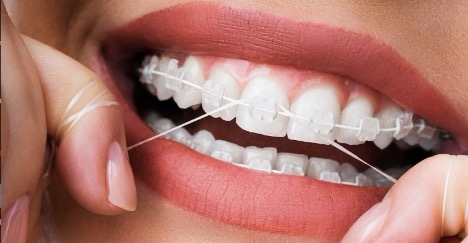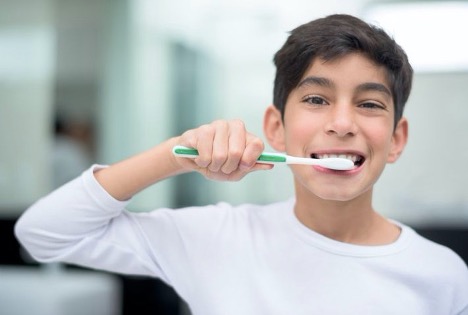Brushing & Flossing best practices
Do you remember a time when you weren’t brushing and flossing your teeth? This should be a lifelong habit that you developed as a little kid so most of us do it almost automatically: wash your face, brush & floss your teeth, go to bed. Get up, brush your teeth, and comb your hair. They are common rituals for most of us. But you’d be surprised how many questions we get about brushing and flossing – it turns out it’s more complicated than we all give it credit for! Take a look at some of our favorite questions (and answers) about the all-important brushing and flossing.
How Many Times Should I Brush My Teeth Each Day?
We would love to hear that everyone brushes their teeth after every meal and snack (and sugary drink!) but we know that’s not always possible for everyone. At minimum, we want you to brush twice a day – once in the morning and once at night. If you have braces, dentures, or are cavity-prone, we highly suggest that you make an effort to brush every time you eat or drink (other than water).
If I Brush My Teeth at Night, Why Do I Have to Brush Them in the Morning Again?
Even if you haven’t eaten between brushing your teeth at night and brushing in the morning, it’s still really important to brush in the morning. Overnight, bacteria have been able to grow in your mouth – that’s what morning breath is! So get scrubbing and get those bacteria out and get a nice, fresh mouth, first thing in the AM.
When Should I Floss?
If you only floss once a day, it should be at night, when you brush your teeth before bed. This assures that little food particles that have gathered up during the day won’t get a chance to spawn extra bacteria between your teeth while you sleep. That being said, we are all for more frequent flossing! Many people like keeping a stash of the one-time-use mini flossers at work, in the car, or in their gym bag. Then you can do a quick floss every time you eat and make sure there’s nothing embarrassing hanging around in your teeth.
Are Electric Toothbrushes Better Than Regular Ones?
Studies have shown that electric toothbrushes give a slight advantage when it comes to reducing plaque and gingivitis. That being said, we’d rather you brush carefully for a full 2 minutes with a regular toothbrush than brush in a rush with an electric toothbrush. Also, be careful not to brush too hard with an electric toothbrush – you don’t want to damage your enamel. This is important with a regular brush as well, but it’s easier to unknowingly abuse yourself with an electric toothbrush than it is with a regular one.
One caveat to this: if you have arthritis or dexterity issues, an electric toothbrush may make it much easier for you to brush your teeth.
What’s the Best Regular Toothbrush?
Toothbrushes are pretty personal items – literally and figuratively! While we generally encourage everyone to use a soft-bristled toothbrush, the shape and size is up to you. What shape and size fit your mouth and allow you to adequately brush all of your teeth? That’s the right one for you. If you need help selecting the right toothbrush for you or your child, let us know – we’ll be happy to assist.
What’s the Best Toothpaste?
Paste or gel? Spearmint or cinnamon? Whitening or regular? There are a lot of choices out there! How do you choose? First of all, look for the American Dental Association (ADA) seal of approval. This assures you that the toothpaste has been tested and proved to be effective. From there, you might want to consider your tooth-brushing goals. If you have sensitive teeth, choose something that helps with sensitivity. Fluoride is also important, especially if fighting cavities is high on your priority list. Natural toothpastes are also fine, but it’s just as important to look for the ADA seal on these toothpastes as it is on others. For instance, Tom’s of Maine has a great line of all-natural, herbal toothpastes that are approved by the ADA.
Do I Need to Use Mouthwash?
You’ve brushed. You’ve flossed. You’re done. Or are you? Many people ask us if mouthwash is really necessary if you’ve done a good job brushing and flossing. Mouthwash can be effective for people who brush and floss regularly but still have problems controlling plaque. For some people, an antibacterial mouthwash may help stave off periodontal disease. There are few cases in which using mouthwash is harmful, but whatever you do – do NOT substitute brushing and flossing with only using mouthwash!
Don’t Go To Bed Without Brushing Your Teeth
It is no secret that general recommendations from dentists around the world are that you brush at least twice a day, but how important is brushing before you go to sleep? Dentists recommend that you brush twice a day, over brushing and not brushing enough are both serious problems. If you do not brush before you go to bed, everything you ate and drank during the day can lead to plaque buildup that will attack your teeth as you sleep. 
Use a Fluoride Toothpaste
Going to the supermarket and searching for toothpaste can be overwhelming; there are so many products to choose from. When it comes to toothpaste, there are so many different elements that come into play than looking for the one that has the best flavors and whitening power. When you go looking for toothpaste, make sure that it includes fluoride. Fluoride is a leading defense against tooth decay. It works by fighting germs that lead to decay while providing a protective barrier for your teeth.
Why Brushing Your Teeth is So Important 
Taking care of your teeth starts at home! Brush and floss your teeth at least twice a day. There are so many reasons why regular and consistent brushing is essential, and they include:
Preventing Gum Disease: Failing to brush your teeth will lead to the build-up of plaque filled with bacteria. This plaque will lead to Gingivitis and eventually gum disease. Brushing will help prevent this from happening.
Maintaining Fresh Breath: No one ever wants to have to deal with bad breath, and the best way to keep smelly breath away is to brush!
Prevention of Cavities and Tooth Decay: The acidity in plaque ruins the enamel surface of your teeth, and this will cause decay and cavities that will lead to intense pain and sensitivity.
Brushing your teeth is undeniably one of the most important habits that need to be part of your daily routine. Ask your dentist at Sheehan Dental about more steps you can take to keeping your teeth clean and healthy.
Should you Choose a Hard or Soft Toothbrush?
A common myth is that hard toothbrushes are better at scrubbing plaque away than soft brushes. But, in reality, hard brushes can actually work against helping your teeth and gums. Avoid scrubbing your teeth as hard as possible and instead, aim to remove the plaque gently. Use a soft toothbrush to get the job done. It will protect your enamel, gums, and teeth while keeping your mouth sparkling clean.
